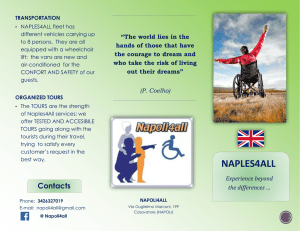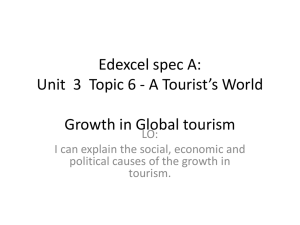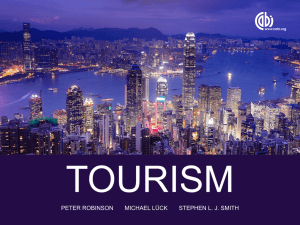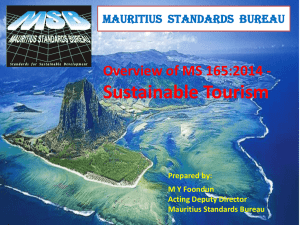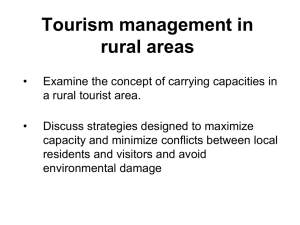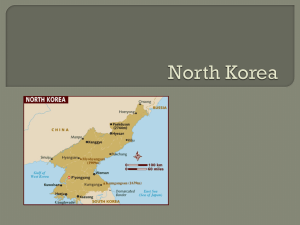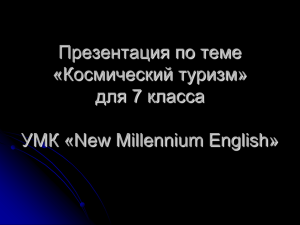Types of Tourism Research
advertisement
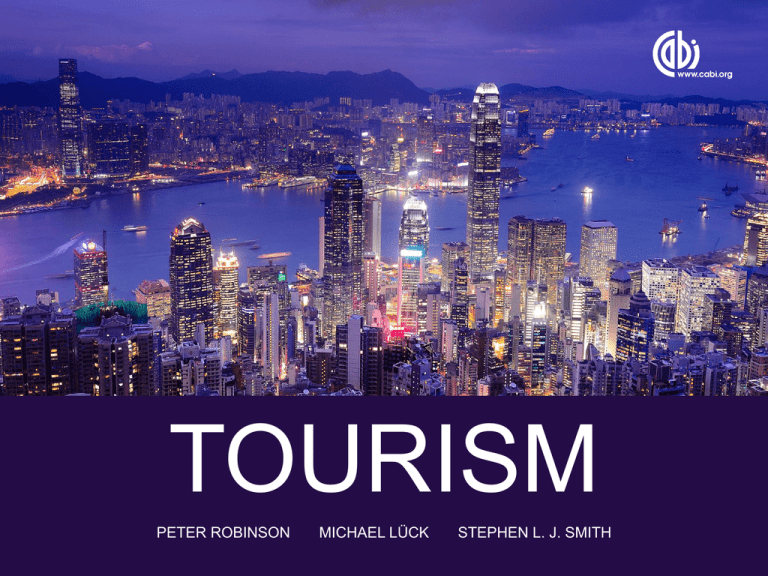
TOURISM PETER ROBINSON MICHAEL LÜCK STEPHEN L. J. SMITH 17 Tourism Research Learning Objectives • To appreciate fundamental approaches to doing research on tourism • To understand key concepts relevant to doing research • To describe the nature of research questions • To understand different styles of research • To discuss the nature of ‘theory’ in tourism research Nature of Tourism Research • Tourism planning, development and marketing depend on good data and analysis • Decisions should be based on evidence – May be either empirical (numerical or independently verifiable) or subjective (not independently verifiable) • Fundamentally: research is about asking and answering questions Research Versus Management Questions • Management questions – Usually multifaceted and complex – May involve personalities, institutional or regulatory challenges, or politics – Often evolves as a result of trying to solve it – May not be solvable through research – Solution may depend on budgets, tact, courage, ability/diplomacy of manager, compromise Research Versus Management Questions • Research questions – Must be answerable – not philosophical or political ruminations – Tend to be more focused than management questions – Answer is evidence-based – Answers based on data and analysis – not personality of researcher General Approaches to Research • Management research: improve management activities such as marketing or operations – Often undertaken or commissioned by a business • Planning research: future-oriented, acquiring information to develop some project – Done by both public and private sectors General Approaches to Research • Policy research: supports the development of tourism policy and government priorities – Potential scope of public policy research is quite wide • Social science research: a search for deeper understanding of some phenomenon – Typically undertaken by a academics – Examines tourism from a wide range of perspectives, such as a form of human behaviour or as a social phenomenon Paradigms • Set of assumptions about the nature of reality and how individuals perceive reality – Epistemology: how we know what we know • The relationship between the researcher and the subject – Ontology: the nature of being or reality of the phenomenon studied – Methodology: the methods or tools used to answer a research question • Empirical • Subjective Empirical Research • Usually based on numbers for coding and typically some form of statistical analysis • Logic is explicit and can be replicated • Often involves hypothesis-testing – The articulation of a possible relationship among variables – Statistical tests are then used to assess whether the hypothesis appears valid Subjective Research • Usually based on words, thoughts, or images – Assumes people interpret experiences in highly personal terms • Also includes ‘content analysis’ – researcher interpreting documents, photographs, other records • Cannot be independently verified Types of Tourism Research • ‘Pure’ research: done solely to increase knowledge • Applied or action research: done to solve a practical problem; initiated by researcher • Consultancy research: commissioned by a client to solve his/her problem Types of Tourism Research • Workplace research: form of action research done internally by an employee(s) of a firm • Delay research: a management tactic using ‘need for research’ to delay making a decision Functions of Research • Description: provides information on what exists • Explanation: generates insights into cause-and-effect relationships • Prediction: forecasts likely outcome of a course of action (or inaction) The Nature of ‘Theory’ • A familiar word used many different ways • Types of ‘theory’ – Theory of the first type: traditional, natural science-type theory; only one theory accepted as valid; produces testable hypotheses – Theory of the second type: similar to first type, but competing theories may exist; common in social sciences The Nature of ‘Theory’ • More types of ‘theory’ – Theory of the third type: label applied to results of statistical testing – Theory of the fourth type: untested/untestable verbal or graphic model – Theory of the fifth type: epistemology presented as ‘theory’ – Theory of the sixth type: ‘grounded theory’ – Theory of the seventh type: ‘theory’ used without any special meaning Phases of a Research Project • Set goals • Review related literature • Develop research design (data collection and analysis methods) • Analysis • Articulate conclusions • Publish/report findings



